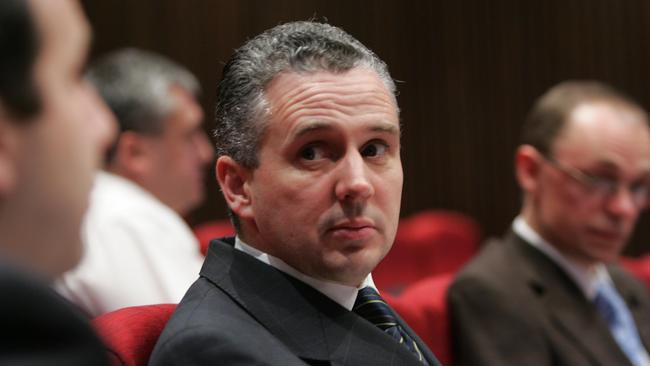Penn case reveals risk of rushing to unleash BEAR on banks
Canberra’s response to our banking woes could take us back to the days when APRA was both investigator and judge.

Commonwealth Bank chairman Catherine Livingstone provided a definition of culture last month in a media teleconference to discuss the impending retirement of chief executive Ian Narev in the wake of the Austrac affair.
She said culture was made up of many elements, including the people in an organisation and their capabilities and the organisation’s processes, policies and systems, including those that relate to risk-management.
In other words, creating or changing culture isn’t simply about shared positive values but involves quite tangible elements like sophisticated systems and processes as well as the behaviours and judgments of individuals. In the Austrac affair, at least some of the alleged failings (and ones that CBA has admitted to) involved a failure of the bank’s technology.
Under the proposed BEAR framework, directors and senior executives of the banks would be held responsible and accountable where they fail to meet the expectations of their regulator, the Australian Prudential Regulation Authority.
Most of those expectations would be broadly and vaguely defined — the BEAR would apply where there was behaviour of a systemic and prudential behaviour. The banks would have a duty to act with integrity and have a responsibility to deal with APRA in an “open and co-operative way.”
No-one, including the banks’ directors and executives, would object to those expectations, which would be in tune with their own aspirations for their organisations’ behaviours.
The difficulty lies in the banks’ ability to perfectly deliver against those expectations.
They are organisations that employ tens of thousands of people and have large and extremely complex technology platforms and layers of people and processes to manage, not just their commercial activities, but their compliance with their regulatory obligations to APRA, the Australian Securities and Investments Commission, the Australian Competition and Consumers Commission, Austrac and others while also meeting the expectations of their customers and the community-at-large.
With BEAR proposing civil penalties of up to $200 million for the major banks (with a $50m maximum fine for smaller authorised deposit-taking institutions) and giving APRA enhanced powers to remove and disqualify directors and senior executives, the fuzziness of the expectations and the extent of the discretionary powers that would be awarded to APRA are extremely intimidating.
The “accountable persons” who could face career-ending and reputation-shredding removal and disqualification if there were a failure to meet APRA’s expectations within their area of accountability would have to try to second-guess how APRA might interpret their obligations in situations with potentially quite specific and unique circumstances.
They could be held responsible for events neither they nor even a relatively robust processes could prevent — a coding error in some software, for instance — or the poor behaviour of an employee or several employees.
The consequences for individuals — directors or senior executives — could, as indicated, be shattering.
APRA already has the ability to direct an authorised deposit-taking institution to remove a director or senior manager and to disqualify someone from being a director or senior manager. For it to disqualify someone from office, however, it has to apply to the Federal Court and the person has the opportunity to defend themselves and their reputation and livelihood.
It wasn’t always the case that court was involved. In 2007 Peter Costello introduced legislation specifically to interpose the Federal Court in circumstances where APRA wanted to disqualify a director or senior manager. Previously those APRA disqualified could only appeal after the event — after, in effect, being found “guilty,” – to the Administrative Appeals Tribunal (AAT).
Costello introduced the court-based process after a 2006 decision by the AAT to overturn APRA’s disqualification of seven former trustees of the AXA staff superannuation fund and an APRA finding that then AXA CEO-elect (and now Telstra CEO) Andy Penn and another executive were not “fit and proper persons.”
That APRA finding, which related to changes made to what everyone concluded were unsustainable benefit features within the AXA fund, and the way they were presented to members, could have destroyed Penn’s now-illustrious career but the AAT completely exonerated him and his fellow trustees and led to a major and successful protest from the financial services sector about the extent of APRA’s powers.
In effect, the BEAR proposals would reinstate the pre-2007 situation where APRA would be both investigator and judge of an accountable person’s behaviour and where the onus of proof would be reversed — the disqualified person would again need to prove they had acted reasonably and with integrity rather than APRA having to make the case that they hadn’t.
While there might still be an avenue of appeal against a decision, the reputation and finances of the executive or director would be immediately and probably irreversibly damaged, even if they subsequently won the appeal.
The consultation period for what is a very significant proposal, one that could have a range of powerful and not necessarily intended impacts on the banks and their boards and senior executives and one which has a number of overlaps and tensions with existing Corporations Act provisions and with APRA’s own existing prudential standards, was a mere three weeks.
There is, apparently, going to be another consultation period once the government has drafted legislation for BEAR but, with the government targeting mid-October to introduce the legislation, it is unlikely to facilitate a deep and meaningful response.
The concept of BEAR was lifted from the UK’s Senior Managers and Certification Regime, which underwent a lengthy period of consultation and significant change, including the abandonment of an initial plan to reverse the onus of proof, before it was introduced last year.
The UK banks were given nearly three year’s notice to enable them to prepare for it, which provides some insight into how significant an impact these regimes can have on the institutions and individuals concerned and how, to respond, the Australian banks will need not just to address culture as a value (their response to BEAR will be more about compliance than cultural change) but make changes to their systems, processes and perhaps even people.






When the Turnbull Government released the consultation paper for its proposed Banking Executive Accountability Regime earlier this year it was positioned as a response to the poor culture and behaviours of the major banks. That begs the question of whether legislation, no matter how draconian, can remake cultures.